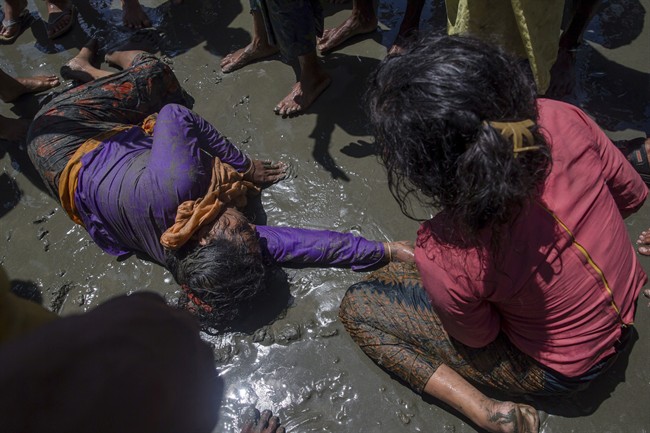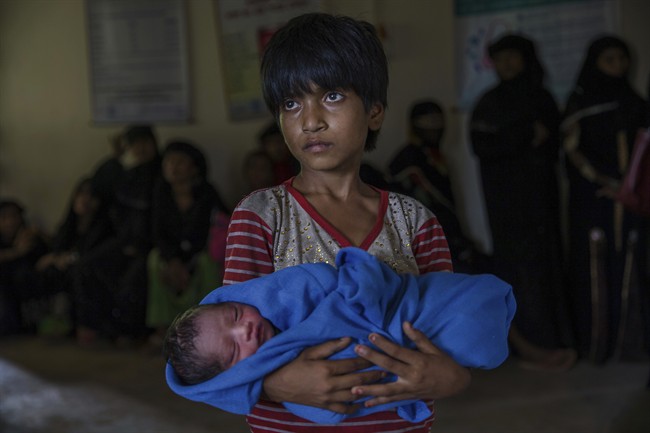TUMBRU, Bangladesh — Groups of fleeing Rohingya Muslims watched from inside Bangladesh on Friday as another of the homes in their abandoned village across the border in Myanmar went up in flames.

The villagers said they’d escaped days ago, crossing into Bangladesh at the border point of Tumbru and joining thousands of other ethnic Rohingya huddling in the open in the district of Bandarban to escape recent violence in Buddhist-majority Myanmar.
READ MORE: Satellite photos show ‘systematic burning’ of Rohingya villages in Myanmar
Flames could be seen only about 500 meters (yards) from the border fence.
“You see this fire today, that is my village,” said Farid Alam, one of the Rohingya.
When they crossed the border into Bangladesh, they saw land mines that had been newly planted by Myanmar forces, he said.
Swipe right for the difference between Maungdaw, Myanmar in Jan. 2014, and the same area in Sept. 2017.
Thousands of Rohingya are continuing to stream across the border, with U.N. officials and others demanding that Myanmar halt what they describe as a campaign of ethnic cleansing that has driven nearly 400,000 Rohingya to flee in the past three weeks.
That number includes an estimated 240,000 children, UNICEF said in Geneva on Friday.
“We had a big house, we are 10 people in the family, but they burned our home,” Alam said as he watched another house burning Friday. “My father was a village doctor, we had a medical store. We had land and cattle, all are gone.”
Ethnic Rohingya have long faced discrimination in Myanmar and are denied citizenship, even though many families have lived there for generations.
After a Rohingya insurgent group attacked police posts in Myanmar’s Rakhine state on Aug. 25, the military responded with “clearance operations.” Fleeing Rohingya say security forces shot indiscriminately, burned their homes and threatened them with death. The government says hundreds died, mostly Rohingya, and that 176 out of 471 Rohingya villages have been abandoned.
WATCH: ‘They torched our houses’: WFP says Rohingya families have arrived in Bangladesh malnourished, hungry

U.N. called violence against Rohingya ‘ethnic cleansing’
U.N. Secretary-General Antonio Guterres on Wednesday described the violence against Rohingya as “ethnic cleansing” — a term that describes an organized effort to rid an area of an ethnic group by displacement, deportation or killing.
Amnesty International said Thursday it has evidence of an “orchestrated campaign of systematic burnings” by Myanmar security forces targeting dozens of Rohingya villages over the last three weeks.
Abul Bashar, a 73-year-old Rohingya in Bandarban, said he traveled 15 days on foot to reach Bangladesh on Wednesday, and was separated from the rest of his family.
READ MORE: Why the minority Muslim group is fleeing Myanmar
He took nothing with him as he fled.
“I have lost everything,” he said. “Our homes were burned. … It was painful, very painful.”
Elsewhere, along a fence near the Kutupalong refugee camp in Bangladesh’s border district of Cox’s Bazar, men, women and children ran after aid trucks as volunteers tossed clothing and packets of dry food.
IN PHOTOS: Images of the violence in Rohingya crisis in Myanmar
With refugee camps overflowing and hundreds of thousands of Rohingya struggling to find shelter, food and other essential services, aid workers say they are deeply worried by the continuing influx of people by land and water.
“This is desperate. It’s one of the biggest man-made crises and mass movements of people in the region for decades,” Martin Faller, a deputy regional director of the International Federation of Red Cross and Red Crescent Societies said in a statement.
“People have no food, water or shelter and they are in desperate need of support. No one should have to live like this,” Faller said.
WATCH: Ongoing coverage of Rohingya Muslims fleeing Myanmar
U.N. refugee agency spokesman Joseph Tripura said that, unless authorities address health concerns, “we might see a very bad situation in coming days” with disease outbreaks.
The International Organization for Migration in Geneva believes “thousands of people are waiting to take boats to Cox’s Bazar,” according to Asia-Pacific spokesman Chris Lom. “There is no sign that this flow is going to dry up.”
READ MORE: Canada urged to revoke Myanmar leader’s honorary citizenship amid Rohingya crisis
U.N. agencies fear continued violence in Myanmar may eventually drive up to 1 million Rohingya into Bangladesh.
“We are worried that children, pregnant women and older people will quickly become malnourished and sick,” Mozharul Huq, secretary general of Bangladesh’s Red Crescent Society added.
“Each day our teams of doctors, nurses and paramedics are treating hundreds of injured and sick people, but the queues keep getting bigger.”
READ MORE: Myanmar’s leader skips U.N. General Assembly, amid violence in country
On Friday, one of the recently arrived refugees, Moulana Arif Ullah, led some 300 other Rohingya Muslim men in weekly prayer.
“There are soldiers over there … we can’t have freedom there,” he said to worshippers at a makeshift mosque at the Kutupalong refugee camp, one of the largest in the area.
He shouted and sobbed as he asked them: “Who can save us? Who can give us food?”
“Allah,” they shouted back.
“What can we do? We pray to Allah. He will save us,” Mohammed Ashikur said as the prayers ended.

































Comments